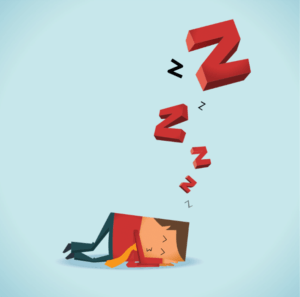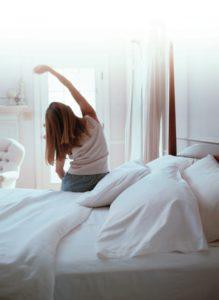If your all-important bedtime routine is on the slide, with bad habits creeping in, read on for ways to help you get your sleep back on track. By Sabeha Syed, a health writer and editor specialising in diabetes care.
Life’s hectic enough at the best of times. Keeping all your plates spinning at work and home, finding your days growing longer while the time for some much-needed shut-eye getting shorter.
Getting enough sleep, and one that isn’t ‘toxic’ (disturbed or inadequate), is important for us to wake up refreshed, mentally and physically – ready to deal with whatever the new day throws at us. In fact, the average adult spends around a third of their life sleeping, needing somewhere between seven to nine hours a night, depending on their age. However, there’s no norm, and some people will need more, or less, than this. But, whatever your norm, more and more of us just aren’t getting enough.
 According to the Sleep Council’s Great British Bedtime Report, 74% of people in the UK are getting less than seven hours’ sleep a night, with one in 10 of us getting less than five. And, for 61% of us, five to seven hours each night is the norm. So, why are so many of us struggling on the sleep front?
According to the Sleep Council’s Great British Bedtime Report, 74% of people in the UK are getting less than seven hours’ sleep a night, with one in 10 of us getting less than five. And, for 61% of us, five to seven hours each night is the norm. So, why are so many of us struggling on the sleep front?
Trouble sleeping?
Finding the underlying reasons for recurring sleep problems is key. Could your diabetes (see Diabetes and Sleep, below) be getting in the way of good quality slumber? Do you need to clean up your sleep hygiene routine? Or, are the hefty demands of everyday life affecting your sleep?
Whatever the cause, if you’ve found yourself slipping into bad sleeping habits that have left you overtired and irritable, make sure sleep is one of your priorities in 2019. We’re quick to commit to healthy eating and exercise as New Year’s resolutions, but rarely think about the benefits to our health when we improve our sleep hygiene routine. So, along with your other resolutions – stick ‘sleep’ at the top of your list! After all, if you’re not getting enough sleep, it’s going to impact on your efforts to get fit and eat healthily in the new year.
There are lots of hints and tips out there, but different approaches suit different people (see ‘Or you could…’, below). For starters, try the following…
In the daytime:
- Get up at roughly the same time each day. Keeping regular hours can be hard, especially at weekends, when you’re likely to be staying up late, seeing friends and family. It’s tempting to have a well-earned lie-in when you’re not working – particularly if you’ve been burning the candle at both ends during the week. But, keeping regular hours can help to programme your body and sleep better.
- Do regular physical activity. Try to do this every day – even now it’s winter. And, if possible, try not to let late nights, food and alcohol (if you drink), get in the way of even a walk, which can help you wind down after the stress and strain of the day. (But, don’t do physical activity too close to bedtime, as it can make you more alert and awake.)
As bedtime approaches:
 Try not to have caffeinated drinks after 4pm in the afternoon. Overcompensating on these during the day, trying to keep yourself awake after a late night, is best avoided. As you get nearer to bedtime, you could try herbal tea or hot milky drink, say.
Try not to have caffeinated drinks after 4pm in the afternoon. Overcompensating on these during the day, trying to keep yourself awake after a late night, is best avoided. As you get nearer to bedtime, you could try herbal tea or hot milky drink, say.- Steer clear of eating a heavy meal or alcohol close to bedtime. According to The Sleep Council, increasing numbers of us in the UK are reaching for booze to try to ease ourselves into the land of nod. In fact, their 2017 report* reveals that a quarter (25 per cent) of those questioned use alcohol as a ‘sleep remedy’ compared to 16 per cent who responded to the survey back in 2013. Although alcohol seems a handy way to help you fall asleep, it can result in an interrupted night’s sleep. So, although it’s easy to get carried away if you’re at a party or do, you could try switching to water a few hours before bed.
- Avoid using your mobile, computer or tablet, or watching TV before you go to bed. The blue light waves of back-lit devices could be impacting on your body clock. A Harvard study suggested avoiding looking at devices like this two hours before hitting the sack. Of course, this can be hard with the increasing reliance on our devices to help us manage our diabetes. However, night mode apps on smartphones and tablets could help – this function may come as a feature on your device, so it’s worth checking out what’s available. Dimming or warming up the light on your device (how cool or warm it looks) may also help.
- Try to keep up your regular bedtime routine – give or take. And, try to relax and unwind as you normally would. Make room for a bit of ‘me time’ by having a warm bath, reading a book or listening to some music.
- Make sure the room you sleep in is dark and quiet – a black-out blind or ear plugs can come in handy. A comfortable bedroom, in terms of the temperature and your bed, helps, too. The ideal temperature for your room is recommended at a cool 16-18ºc. And, if your bed is old – and lumpy, it may be time to hit the sales and invest in a new one.
Still can’t sleep?
Far from bedtime being a time to wind down, relax and switch off after a busy day, worry and stress tops the list of culprits disturbing our sleep, according to The Sleep Council*. Keep a notepad by your bed. If you’re lying awake thinking about your workload or what you need to do the next day, it may help to jot down any worries, or ideas that come into your head.
And, if it’s just not happening for you, get up as there’s no point staring at the ceiling and worrying. Try to do something that’s relaxing for both your mind and body, such as listening to some quiet music, reading a book or having a warm bath. When you start to feel sleepy again, you can then go back to bed.
- When you do go back to bed, turn your clock away from you, so that you won’t be tempted to check the time. You may find that worrying about losing precious sleep before the alarm goes off only feeds your anxiety and prevents you getting back to sleep.
Or you could…
…try yoga, breathing techniques and regular exercise, which are some of the ways that may help calm the mind and help combat sleep problems.
- The Sleep Guru, Anandi, found yoga and Ayuverda helped improve her sleep after many years of insomnia. Anandi, who offers free sleep advice on her website and whose book, Breathe Better, Sleep Better, uses breathing techniques as a tool to help improve sleeping patterns, says: “Ultimately, the key is a series of small, but significant, lifestyle changes which include delaying the temptation to immediately check your emails as soon as you wake up, simple dietary changes and becoming aware of, and using, the breath to connect you to a more peaceful state and nourish your nervous system.”
- Brian Keane, a fitness and health expert,
and author of The Fitness Mindset, explains that understanding our sleeping patterns can boost your energy, improve will power, as well as be of benefit to our general health. “By having knowledge of the tools and tips to help you sleep, you can make a massive difference in your quality of life and in finding out what works best for you and your body. Changing what you do before bed can give you an edge in all other aspects of your life,” Brian says.
- 30 Day Better Sleep Plan. This free self-help tool from The Sleep Council is designed for those who are starting to have trouble with sleep. Answer 18 questions and receive a downloadable tailored plan, which you follow for 30 days using The Sleep Council’s sleep diary to record your progress.
Diabetes and Sleep
If you’re finding that your diabetes is affecting you at night, with you going high or low, then it’s important to talk to your diabetes team about it. And, keep your meter and hypo treatments by your bed.
- If your insulin or diabetes medication is causing hypos, then nocturnal or night-time hypos may affect you without you realising it. But, in the morning, they might leave you feeling like you have a hangover, even if you didn’t touch a drop of the hard stuff the night before! You might also remember having had vivid dreams.
- High sugar levels at night, however, can leave you weary the next day. This is because they affect your sleep – making you restless and warm, and giving you headaches or leaving you feeling thirsty. You could also end up traipsing to the loo a lot. It’s not surprising then that regularly high blood sugars could significantly impact on the quality of your sleep.
News items and features like this appear in the Desang Diabetes Magazine, our free-to-receive digital journal (see below). We cover diabetes news, diabetes management equipment (diabetes ‘kit’ such as insulin pumps and continuous glucose monitoring equipment) and news about food suitable for a diabetic diet including a regular Making Carbs Count column. We just need your email address to subscribe you (it’s free, and you can easily unsubscribe should you wish to).





